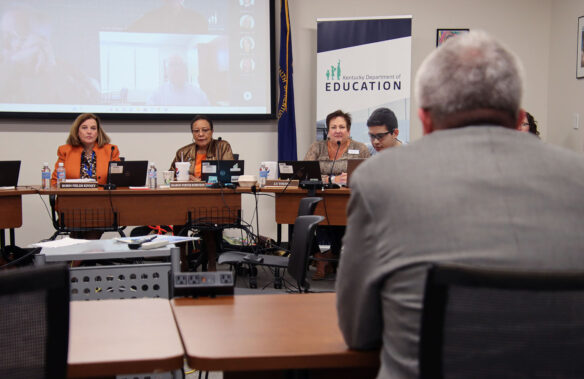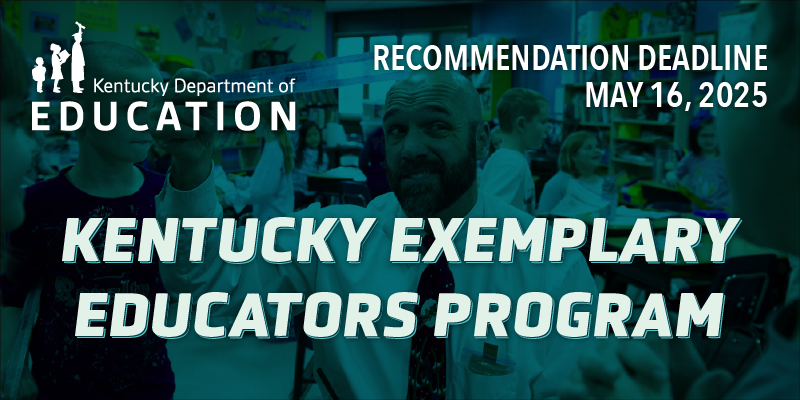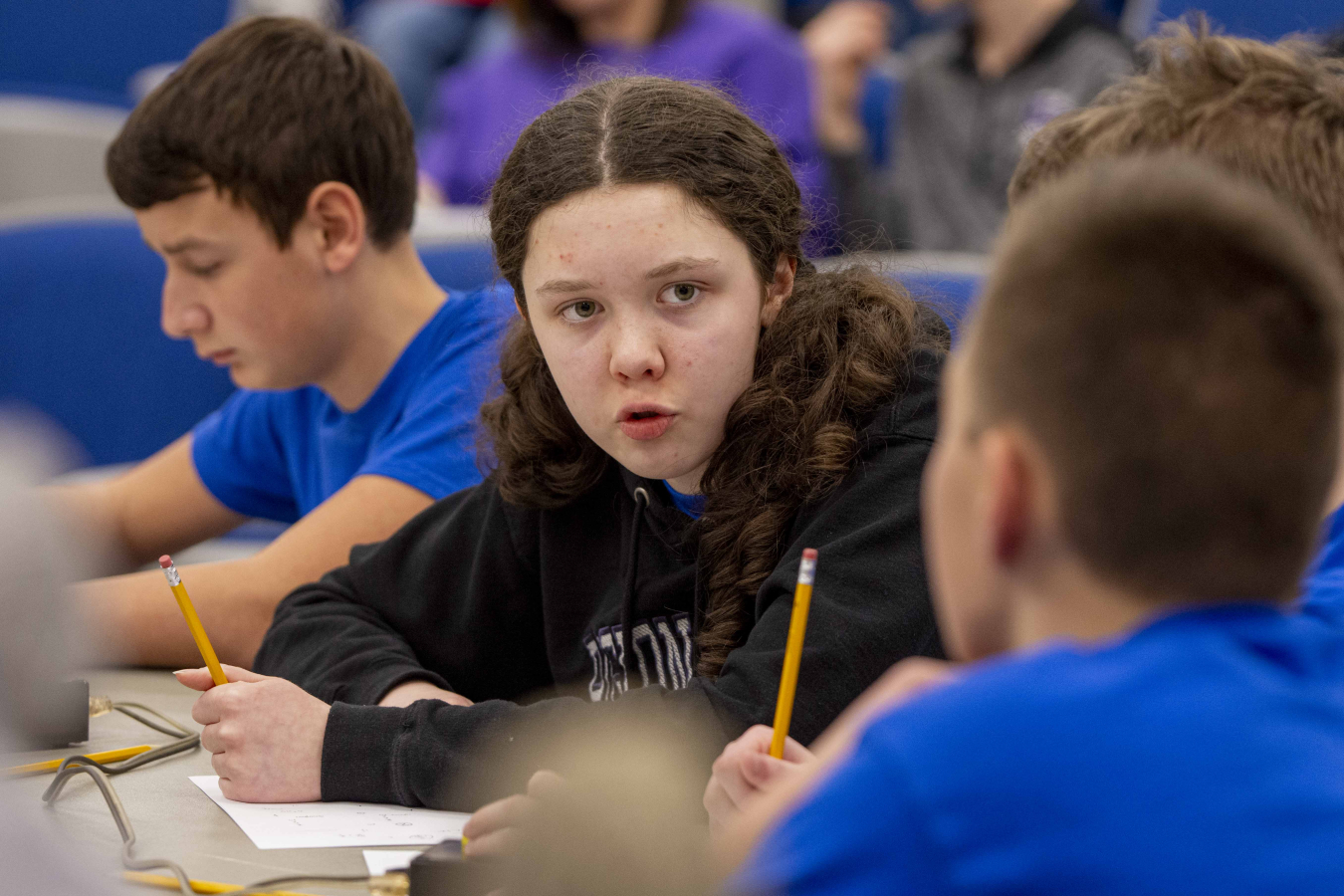
Interim Commissioner Robin Kinney, Kentucky Board of Education (KBE) chair Sharon Porter Robinson and KBE vice chair Lu S. Young listen to a presentation during the board’s meeting on Oct. 10. Photo by Joe Ragusa, Kentucky Department of Education, Oct. 10, 2023.
Members of the Kentucky Board of Education (KBE) heard an update on early literacy instruction in educator preparation programs from Kentucky Department of Education (KDE) staff during their Oct. 10-11 meeting.
Senate Bill 9 (2022), also known as the Read to Succeed Act, spurred several changes with early literacy instruction. On the teacher preparation side, the legislation focused on areas of phonemic awareness, phonics, fluency, vocabulary and comprehension.
Byron Darnall, associate commissioner in the Office of Educator Licensure and Effectiveness, said the work has been “quite the endeavor” so far.
KDE created an early literacy cohort of college and university education program representatives to make recommendations on the assessment of reading instruction knowledge and skill, evaluate current early literacy curriculum, provide recommendations of modification to current early literacy curriculum, and to determine what supports are needed to ensure early literacy knowledge and skills are sufficient for a first-year teacher across all educator preparation programs in Kentucky.
The Read to Succeed Act also amended KRS 164.306 and requires the Education Professional Standards Board (EPSB) to develop and maintain a list of approved teacher preparation tests for the effective evaluation of reading instruction knowledge and skills. Beginning in the 2024-2025 school year, all new teachers seeking certification must pass an approved teacher preparation test that includes evaluation of reading instruction knowledge and skills.
In August and September, the cohort evaluated the current Elementary Education Reading and Language Arts assessments, along with several other assessments to become certified teachers.
Melissa Diebel, an education academic program manager with KDE, said the cohort recommended adding the Praxis Teaching Reading: Elementary test (Praxis 5205) to the list of state requirements. In order to ease into the change, Diebel said the cohort recommended a year with no cut scores so no harm is done to prospective teachers with different curricula within their literacy coursework.
Diebel said their recommendations for this additional test, if approved, will begin in August 2024. Diebel said funding for the cost of Praxis exams for prospective educators is available through the Kentucky Academy for Equity in Teaching Praxis Reimbursement Program.
KBE member Randy Poe asked whether more needs to be done by universities at the postsecondary level to strengthen the teachers coming into the classroom.
“If we don’t get reading right and we don’t get math right, the others don’t matter,” said Poe. “I just don’t see these going far enough in teacher preparation for us to make an improvement in reading that we need.”
Poe said he has been pleased with the impact Language Essentials for Teachers of Reading and Spelling (LETRS) training through the Kentucky Reading Academies has had on literacy instruction. LETRS is a two-year, in-depth, job-embedded professional learning series; it is not a program. The training prepares teachers to learn and use any well-designed reading program to better meet the diverse reading needs of early readers.
The next EPSB meeting is Dec. 11, where members will have an opportunity to vote on the final assessments.
Early Entry Grant
KDE is participating in the only national pilot program with the National Board for Professional Teaching Standards (NBPTS) to help early-career educators through the process of becoming a National Board Certified Teacher (NBCT).
The grant provides 78 educators with 1-3 years of teaching experience with professional learning opportunities to help them through the NBCT process. Currently, teachers need at least three years of experience to begin the NBCT process, which entitles teachers to a $2,000 salary bonus for the life of their certificate and a promotion in rank.
Representatives with Spencer County Middle School told KBE members about the pilot program in their school, where four teachers are currently participating.
“There’s no reason for us to make a young, eager teacher wait until their fourth year to do National Board if they’re willing and they can be supported and they can do the work,” said Spencer County Superintendent Willie Foster.
Foster said the program helps keep young people in the teaching profession, and it helps keep talented educators in Spencer County.
“The early access program has given us the opportunity to challenge ourselves, to critique our own teaching,” said NBCT candidate Logan Holbrook, a teacher at Spencer County Middle School.
Holbrook said the program is helping him pursue a rank change and the benefits that come with it.
“Getting that support within my own school, it was just a no-brainer to me,” he said.
United We Learn
Board members heard updates on the Kentucky United We Learn Council, which is getting ready for its next convening Nov. 2-3 in Frankfort.
Karen Dodd, KDE chief performance officer, presented the results of a survey of Kentucky United We Learn councilmembers regarding the council’s first full year of work. As part of the survey, 50 members renewed their membership for year two.
The survey also included information on what stakeholder groups make up the council:
- Educators: 38.2%
- Family: 23.6%
- Community Members and Business Leaders: 23.6%
- Students: 14.5%
Some of the positives council members shared in the survey are the opportunities to network with others in education, how well-organized the meetings are and an overall excitement over the direction of the work. Feedback from the survey also indicated some themes to improve on, including better communication between standing committees, clearing up the vision and goals of the council, increasing member participation and improving the scheduling of the meetings.
Dodd said KDE will recommit to United We Learn under new Interim Commissioner Robin Kinney at the next Kentucky United We Learn Council meeting.
“From the very beginning, that has been a fear of the folks on this council,” Dodd said. “’This is four years. Is this really going to take? Are we really going to make a difference?’ We want to keep assuring them that all systems are go.”
Legislative priorities
The KBE approved a list of priorities ahead of the 2024 regular legislative session, which will be a budget session. Lawmakers return to Frankfort on Jan. 2.
The legislative priorities KBE will support include a list of additional budget requests that were approved during the KBE meeting on Aug. 2-3 as well as:
- Revise distribution formula to create equity for every career and technical education (CTE) student and program;
- Provide more support for Kentucky’s state schools, including the Kentucky School for the Blind and the Kentucky School for the Deaf;
- Additional flexibility to funds provided for Advanced Placement tests to provide additional services to students and teachers with funds not expended on tests;
- Clean up outdated and/or unused statutory reporting requirements that cost districts time and money;
- Codify House Bill 678 (2022), a bill that expedited district facility plans, to make permanent district flexibilities and provide predictability for facility processes; and
- Amend KRS 162.060 to provide districts with final design plan approval authority over new school building proposals and renovation plans for existing buildings.
KBE members also approved a list of goals that indicate a commitment to equity and align with the three facets of United We Learn: promoting vibrant student experiences, accelerating innovation and collaboration with communities.
In other business:
- The board began work on crafting new KBE mission and vision statements;
- Approved amendments to 705 KAR 4:231, general program standards for secondary career and technical education (CTE) programs, to keep up with Perkins V requirements and align with current state CTE programs;
- Approved 702 KAR 3:330 following changes made by Senate Bill 3 (2023) regarding liability insurance;
- Heard an update on Special Olympics Kentucky and the Unified Champion Schools initiative with representatives from Bullitt County and Carter County;
- Approved a waiver from the Murray Independent school district allowing the district to move elementary school students into a new building;
- Approved waivers for the Jefferson County school district on a property easement adjacent to Fairdale High School; and
- Awarded the 2023 Kelly Award for Business and Education Partnership to Bluegrass Community Health Center and Keith Schneider, president of Square 1.
The next KBE meeting is scheduled for Dec. 6-7 in Frankfort. All KBE meetings, including this one, are archived on the KDE Media Portal.




Leave A Comment